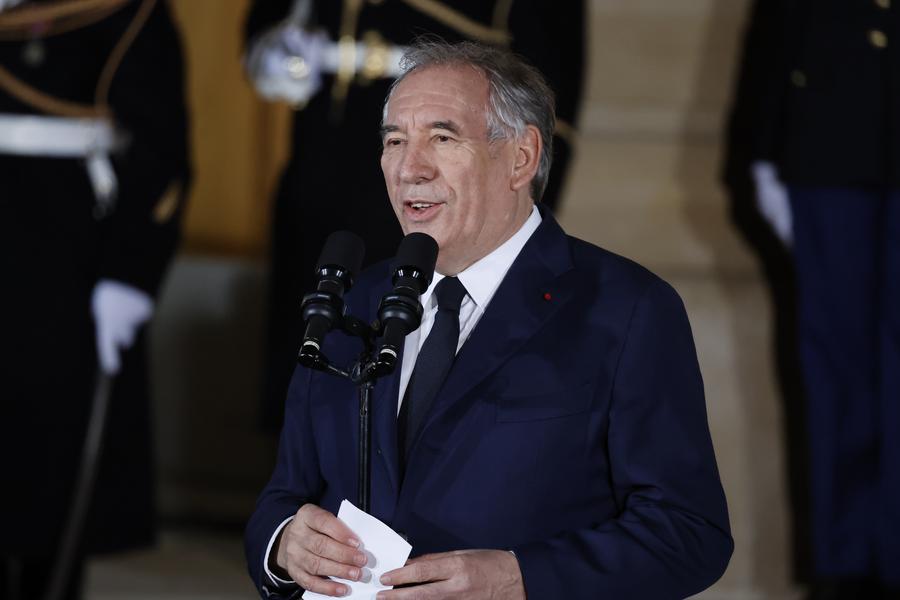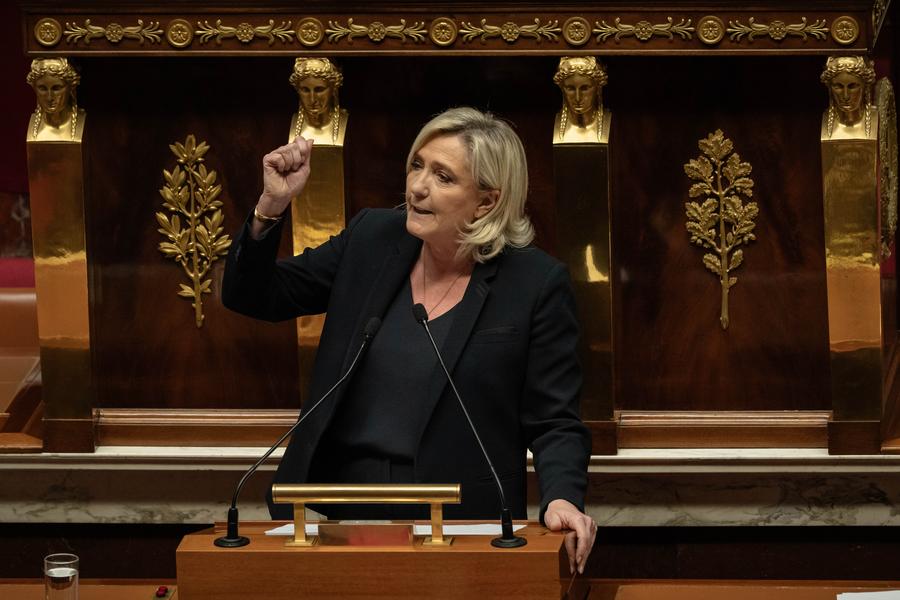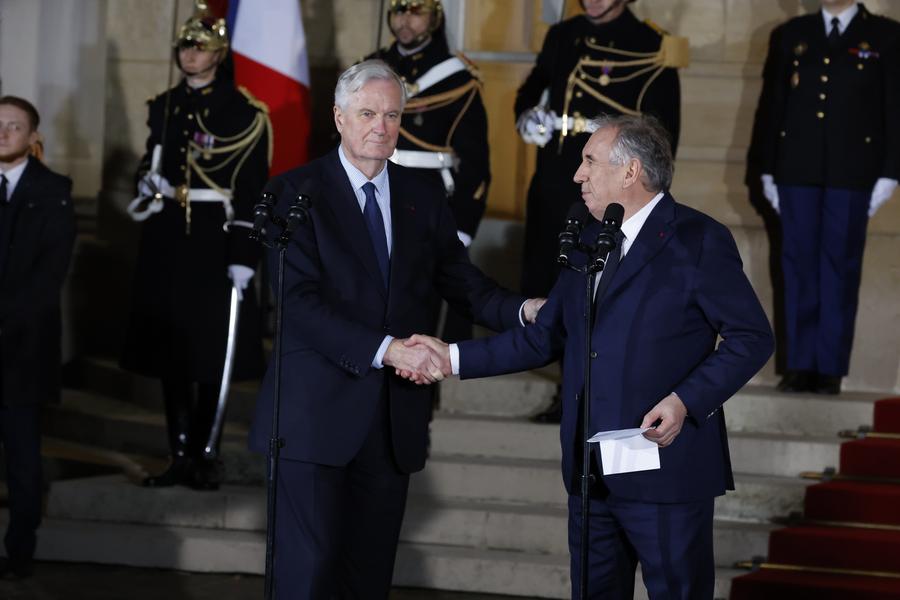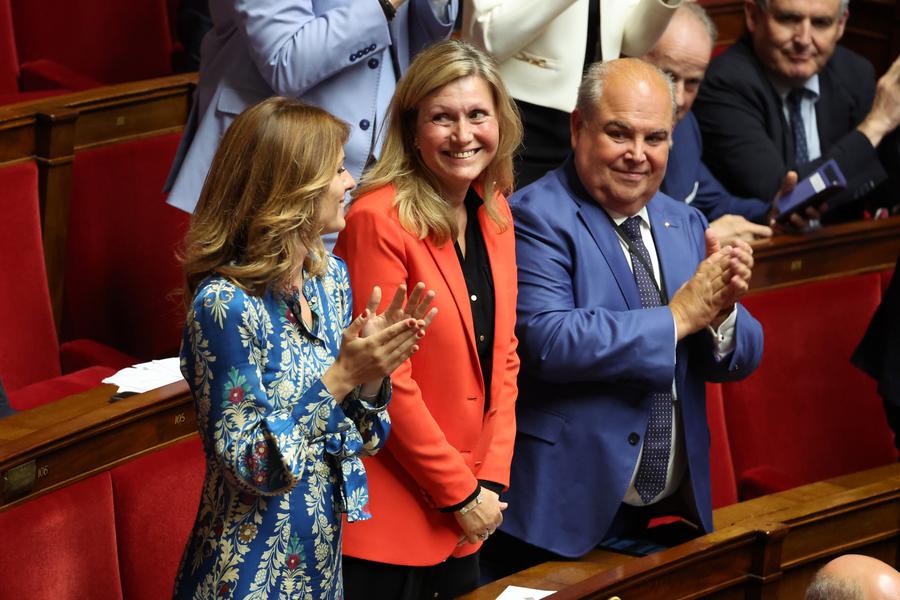Hopes high for France's 4th PM this year to mend fractures

Francois Bayrou speaks at the transfer of power ceremony in Paris, France, on Dec. 13, 2024. (Photo by Henri Szwarc/Xinhua)
As French President Emmanuel Macron's centralist ally navigates the fractured domestic political landscape, Bayrou could restore much-needed France-Germany cooperation with a second Donald Trump term on the horizon.
PARIS, Dec. 15 (Xinhua) -- Francois Bayrou's nomination as French prime minister -- the fourth this year to serve in the post -- provides a silver lining in France's political impasse.
As French President Emmanuel Macron's centralist ally navigates the fractured domestic political landscape, Bayrou could restore much-needed France-Germany cooperation with a second Donald Trump term on the horizon.
BAYROU'S TIGHTROPE
Following Bayrou's nomination, the far-right wing party National Rally (RN) announced that the party would not immediately censure Bayrou.
The president of the RN, Jordan Bardella, told French news channel BFMTV that Bayrou should "understand that he has no democratic legitimacy nor the majority in the National Assembly, which requires a dialogue with all the forces represented in the parliament."
The RN's former president, Marine Le Pen, who came in third in the previous presidential elections, called on Bayrou to "hear and listen to the oppositions to build a reasonable and thoughtful budget."
"Any other policy that would simply be an extension of Macronism, twice rejected at the ballot box, could only lead to deadlock and failure," she said on her X account.

Former French far-right party leader Marine Le Pen speaks during a debate on no-confidence motions against the government at the National Assembly in Paris, France, on Dec. 4, 2024. (Photo by Aurelien Morissard/Xinhua)
Meanwhile, the hard-left party La France Insoumise has announced it will launch a no-confidence vote to bring down Bayrou.
The party has repeatedly said that the prime minister's position should be given to someone from the alliance of left-wing parties, which won the most seats in this year's snap legislative elections.
But other parties from the left-wing alliance New Popular Front are less aggressive about Bayrou's nomination and have laid out conditions for their support.
In a letter addressed to Bayrou, the Socialist Party said Macron's choice to nominate a "prime minister from his camp" risked "worsening the political and democratic crisis in which he has placed the country since the dissolution (of the National Assembly)."
The Socialist Party demanded that the new prime minister renounce using special constitutional powers to pass laws without a vote in the National Assembly in exchange for not voting to topple him.
The party, which will not participate in the upcoming government, also asked Bayrou to distance himself from the far-right-wing party RN and the "xenophobic" program of the RN.
The French Communist Party announced it wouldn't topple Bayrou "if there is no Article 49.3," the special constitutional power deployed by the last Prime Minister Michel Barnier to force passage of the 2025 social security budget without parliamentary approval.

Francois Bayrou (R, Front) shakes hands with outgoing French Prime Minister Michel Barnier (L, Front) at the transfer of power ceremony in Paris, France, on Dec. 13, 2024. (Photo by Henri Szwarc/Xinhua)
For Marine Tondelier, leader of The Ecologists party, if Bayrou refuses to take action on pensions, the environment, and tax justice, her party would see no choice but to vote to topple him.
TWO BANKS OF THE RHINE
Following Donald Trump's election victory, Macron spoke with German Chancellor Olaf Scholz, seeking to "work for a more united, stronger, more sovereign Europe."
Yet, a stronger France-Germany cooperation faces challenges as both countries struggle with domestic political gridlock.
According to Politico, at the Berlin Global Dialogue held in October, Scholz and Macron diverged on key topics, including proposals for joint EU borrowing, trade talks with South American countries, and how to counter the protectionist United States.
Germany, Europe's largest economy, is also mired in a political crisis. Next week, the current government will face a vote of confidence in the lower house of parliament, the Bundestag.
Last month, governor of the French central bank Francois Villeroy de Galhau called on France and Germany to unite to tackle risks facing Europe.
"Today, the French-German dialogue has been weakened, mainly due to domestic political instability on both sides of the Rhine," de Galhau said.
"To divide us would be to condemn us, and to condemn Europe," he said. De Galhau referred to long-term challenges facing Europe like climate change, an aging population, digitalization, geopolitical crises and Trump's election victory.
Europe appears to have made partial strides with the appointment of France's new prime minister. However, it remains to be seen whether Europe, guided by France and Germany, can be a balancing force during a second Trump term.
HOW FRANCE GOT HERE
France's political instability started in June when Macron announced the dissolution of the National Assembly after being defeated in the European parliamentary elections.
In the two rounds of legislative elections held on June 30 and July 7, Macron's centrist coalition lost the absolute majority, allowing the left-wing alliance of parties, the New Popular Front, to secure a relative majority in the 577-member National Assembly.
Instead of immediately nominating a prime minister from the winning camp, Macron accepted the resignation of Gabriel Attal but asked him to lead a caretaker government.
The ministers from Attal's government voted in the election of the speaker of the National Assembly, during which Yael Braun-Pivet, from Macron's party, was re-elected.

Yael Braun-Pivet reacts after being re-elected as Speaker of the French National Assembly in Paris, France, on July 18, 2024. (Photo by Henri Szwarc/Xinhua)
Two months after the legislative elections, Macron finally nominated Michel Barnier from the right-wing The Republicans party to form an "inclusive" government.
With Barnier using special constitutional power 49.3 to force passage of the 2025 social security budget without parliamentary approval, the deputies of the French National Assembly voted in favor of a no-confidence vote, forcing Barnier to resign and his government to collapse.
A total of 331 deputies, mainly from the New Popular Front and RN, voted in favor. In the history of French politics, it was a rare sight to behold for the left and far right to join forces.
It marked a significant political crisis for France, as Barnier's government became the first to fall to a no-confidence vote since 1962. In 2024, France has seen four prime ministers: Elisabeth Borne, Attal, Barnier, and now Bayrou.
Photos
Related Stories
Copyright © 2024 People's Daily Online. All Rights Reserved.









